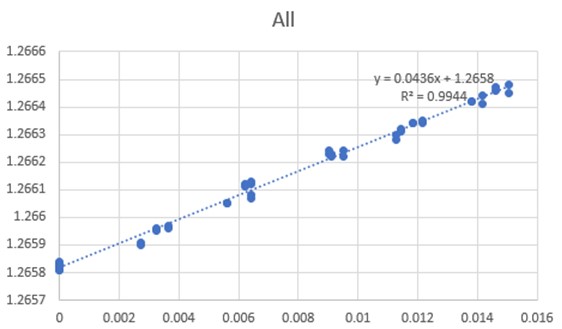Measurement of Concentration Dependence of Refractive Index to Enhance Gel Permeation Chromatography for Polymer Characterization
Author: Gabor Kiss
Date: October 2019
Background:
One of the workhorse techniques for polymer characterization is Gel Permeation Chromatography (GPC) which is used to measure molecular weight, molecular weight distribution, degree of branching, radius of gyration, solvent power, etc. The instrument relies on small changes in índice de refração due to the presence of polymer in a solvent (called the “mobile phase”) to generate an “elution curve” as solution is pumped through a porous medium. The determinant parameter is the change of refractive index with concentration, called dn/dC. This parameter varies widely among polymer/solvent systems. It is possible to use GPC if one does not know dn/dC, by assuming 100% “recovery ratio”, i.e. that no polymer is lost due to absorption within the GPC column. However, if one knows dn/dC, this assumption is not required, so measurements are more precise. Indeed, by knowing dn/dC the Recovery Ratio becomes a figure of merit, the closer to 100% the better, indicating valid measurement results, and thus enhancing the Gel Permeation Chromatography technique.
The Challenge:
Chromis Technologies manufactures polymer optical fibers which are used in a line of Active Optical Cables (AOC) for datacenter and audiovisual applications. The polymer is a specialized perfluorinated amorphous polymer. In order to expand the application space addressed by these polymers into separations, coatings, and others, Chromis embarked on a polymer development program. GPC was one of the polymer characterization techniques brought to bear in this program.
A key step in the polymer synthesis process is post-processing of a precursor polymer. Chromis was faced with the question of whether the intensity of post-processing impacts dn/dC. If so, then GPC elution curves of polymers with different degrees of post-processing could not be compared directly and MW / MWD measurements would be less meaningful.
In order to answer this question, Chromis engaged with Rudolph Research Analytical to measure the refractive index of dilute solutions over a range of concentrations. This was an extremely demanding application for three reasons:
1) Gel Permeation Chromatography requires that solutions be dilute to the point that polymer molecules do not interact. Since polymers are large molecules, the solutions are extremely dilute so refractive index changes are small, on the order of 0.05% over the range of concentrations studied.
2) The perfluorinated solvent needed for this application has an extremely low value of refractive index, out of the range of competing refractometers
3) The particular polymer/solvent system has low dn/dC so the measurement is even more difficult
As shown below, the Rudolph J457 Laboratory Refractometer met this challenge brilliantly.
Results:
The four plots below show refractive index measurements over a range of concentrations from 0 (pure solvent) to about 15 mg/mL for several polymers with different number of post-processing cycles.




Note the extremely narrow range spanned by these data (1.2658 – 1.2665 = 0.0008 or about 0.06%). Despite that, the reproducibility at each concentration is excellent and all data fall on beautiful straight lines with correlation coefficient very close to 1. The dn/dC calculated for each polymer is very close. Even more compelling, when all of the data are plotted together, it is clear that dn/dC does not depend on intensity of post-processing for the dilute solutions used by the Gel Permeation Chromatography.

Conclusion:
By using the Rudolph Research Analytical J457 Laboratory Refractometer, Chromis was able to easily and quickly obtain the data required to answer a key question in their polymer development program and thereby maximize the benefit from their investment in a sophisticated GPC apparatus.
Anyone using Gel Permeation Chromatography (GPC) would benefit from this approach, which uses Refractive Index measurements to obtain a key GPC parameter. This improves the precision and accuracy of GPC measurements beyond that which GPC alone can provide.

 Download: Measurement of Concentration Dependence of Refractive Index to Enhance Gel Permeation Chromatography for Polymer Characterization
Download: Measurement of Concentration Dependence of Refractive Index to Enhance Gel Permeation Chromatography for Polymer Characterization